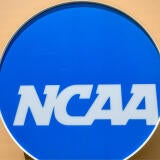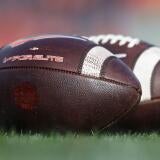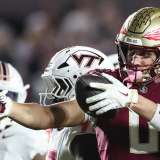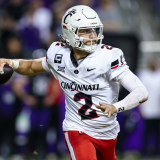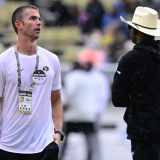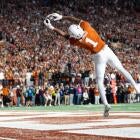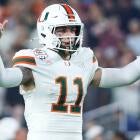It’s time for refs to start ejecting college football coaches for wild behavior
Enough is enough, and it's time for a change that will improve the game

By stepping onto the field and erupting at the College Football Playoff National Championship, Clemson coach Dabo Swinney became a poster child for bad coaching behavior. The video of Swinney is making the rounds this offseason among conference officiating coordinators, marking the second straight year he exploded while on the field at the national championship game.
This year, Swinney was furious that the Big 12 officiating crew seemed to miss a call on Alabama for pass interference. He slammed his hat down without letting go. He hollered and paced for at least 20 seconds. He gestured wildly at the field judge. A Clemson staff member tried unsuccessfully to pull Swinney by his sweatshirt back to the sideline.
By rule, the officials should have called unsportsmanlike conduct on Swinney. They didn’t.
“I think it’s a valid point to say pass interference would have been the right call on that play,” Big 12 officiating coordinator Walt Anderson said. “But whether it was called or not, two wrongs don’t make a right. It doesn’t give the coach the opportunity to act like he did.”
Swinney was hardly alone in 2016, the first season in which the NCAA explicitly stated coaches are automatically ejected for two unsportsmanlike conduct penalties in a game. Pockets of coaches kept treating the playing field like their personal sanctuary to act like multi-million-dollar mad men.
Not a single coach got ejected at the FBS or FCS level in 2016, according to the NCAA. One officiating coordinator, who asked to remain anonymous, put it this way: “Nobody wants to be the first to do it. It will be huge news. I’ve told our guys, ‘If a coach makes you do that, then you’ve just got to do it.’”
Frankly, some ejections are needed to restore some sanity and reduce the amount of influence coaches can have on officiating calls. Some coaches, the supposed adults, are getting away with behavior that would never be accepted from players. What will it take for a football coach to get tossed from a game?
“Pretty bad behavior,” Anderson said. “We’re trying to correct this. It’s like making an omelet. We are going to have to break a few eggs to change the culture and may make a few mistakes.”
Understandably, no referee wants to toss a coach, especially if the officials erred on the call. Contrary to what many fans believe, officials don’t always screw up. Sometimes coaches have a legitimate beef; sometimes they’re totally clueless about a rule or what they think they saw.
“We need to get the genie back in the bottle,” American Athletic Conference officiating coordinator Terry McAulay said. “It’s not fair to the vast majority of the coaches who are phenomenal and coach within the rules. Eventually, they’re not going to coach within the rules if their counterparts get away with it. Then we’ll have utter chaos. The perception is the coach violating the rule is going to get the next call because if I make a call against him, I’ll have to deal with this again. I don’t think that happens in practice, but it certainly is the perception and that’s a problem.”
Except sideline bias by working the refs is real, according to a recent study by authors Noah Davis and Michael Lopez, who analyzed every NFL regular season play from 2010-14.
They found that several common defensive penalties -- pass interference, personal fouls, unsportsmanlike conduct and horse-collar tackles -- were called significantly more often when plays were run toward the side of the field with the offensive bench. Conversely, offensive holding penalties were called more frequently on plays run toward the defensive bench.
Those differences weren’t the same everywhere on the field. The study found the effect only shows up on plays run, roughly, between the 32-yard lines -- the space where NFL coaches and players are allowed to stand. Close to the end zone, where the sidelines are supposed to be without coaches and players, there’s not much difference on penalty calls.
“Deprived of the advantages like instant replay that we enjoy from the couch, refs have less information to help them resist the normal subconscious urge to draw on external cues for assistance in making borderline calls,” the authors wrote for FiveThirtyEight.com. “In psychology terms, this process is called cue learning. It’s why we laugh longer in the presence of other humans laughing, why we eat more in the presence of overweight company, and why our judgment of persuasive speeches is influenced by the audience’s reaction.”
Alabama coach Nick Saban flat-out said working the refs is exactly why he came onto the field to jaw with officials at Arkansas last season.
“It’s just like the manager that goes out in baseball,” Saban said with a smile in October, according to AL.com. “Did you ever see a manager come out in baseball and argue the call and the umpire changed the call? No. You’re trying to get it right the next time. You’re just trying to make sure they get it right the next time.”
National officiating coordinator Rogers Redding sent a memo this month to conferences reminding them of sideline rules because “a small minority of coaches continue to come on to the field of play regularly during the course of a game, in clear violation of the rules.” The memo advised “there will be an emphasis nationally to apply these rules fairly and consistently.”
The NCAA didn’t provide data on the number of unsportsmanlike conduct penalties on coaches. Anecdotally, several officiating coordinators said they think more got called in 2016.
If you talk to some officials and officiating coordinators, they can easily identify difficult coaches who violate the sideline rule. They include, but aren’t limited to, these coaches:
Swinney, who has argued on the field beyond the past two national championship game. Check him out as he went wild against Pittsburgh in 2016.
Florida State coach Jimbo Fisher, who had an epic rant while arguing over a chop block call against Clemson with the Seminoles’ sideline getting an unsportsmanlike conduct penalty. After the game, Fisher said the chop block call was “ridiculous” and the unsportsmanlike conduct penalty was “cowardly, gutless and wrong.” The ACC fined Florida State $20,000.
Pittsburgh coach Pat Narduzzi, who has thrown his headset over calls and repeatedly comes onto the field to complain. Pitt got fined $5,000 by the ACC for Narduzzi publicly criticizing officials. “The ACC has more coaches than anybody else that are a problem,” one official said. ACC officiating coordinator Dennis Hennigan said he will address the NCAA’s new point of emphasis with ACC coaches. “I don’t anticipate it being a problem,” he said. “Some coaches are more emotional and excitable than others. As officials, what we want to do is not meet emotion with emotion and just defuse the situation. A 15-yard penalty is significant, and we want to do what we can to avoid throwing that flag.”
Michigan coach Jim Harbaugh, who got penalized when he slammed his headset and threw a play sheet so far it ended up in the middle of the field against Ohio State. Michigan was fined $10,000 by the Big Ten for Harbaugh’s post-game criticism of the officials.
Arkansas coach Bret Bielema, who is “always on the field complaining,” said one official. He received an unsportsmanlike conduct penalty for complaining on the field against Alabama.
Saban, who ran more than 10 yards onto the field to dispute a roughing the passer penalty in the same Arkansas game. Bielema got penalized; Saban didn’t.
West Virginia coach Dana Holgorsen, who is “constantly out of control,” said one official. “It feels like every week with him.”
Mississippi State coach Dan Mullen, who got flagged for unsportsmanlike conduct after slamming his headset down on the field while arguing officials missed a block-in-the-back penalty on a touchdown.
UCLA coach Jim Mora Jr., who drew an unsportsmanlike conduct penalty against Arizona after screaming at officials over a call the Pac-12 and NCAA later said was correct. Mora was reprimanded by the Pac-12 for publicly criticizing the officiating.
Unsportsmanlike penalty on Mora moves the chains for Arizona. pic.twitter.com/j1nAylkqj3
— Bruin Report Online (@BruinReport) October 2, 2016
“There are some high-profile situations where the coach behavior is not what we’d like, and I think the officials are calling [unsportsmanlike conduct] when they feel like it’s really out of line,” Redding said. “It doesn’t happen a lot. When it does, it gets a lot of notice. That’s part of the challenge for the officials: When are we going to call this, when are we not?”
American Football Coaches Association executive director Todd Berry said he’s “very proud” of the way coaches act, adding that it’s “a very, very small minority” who behave poorly.
“Does society act as well as our coaches do? You’d probably say no, they don’t,” Berry said. “We can still always be better. But I don’t know that the rule that was put in play [two unsportsmanlike conduct penalties resulting in an ejection] created a different thought process for any of our coaches.”
OK. Then officials need to create a different thought process for that very, very small minority. Why not call unsportsmanlike conduct penalties more frequently and eject a coach when necessary?
“I don’t know if most of the time it gets to that point,” Berry said. “Are there going to be some disagreements at times? Absolutely. Can both sides take it too far? Absolutely. I disagreed with an official one time and he started throwing obscenities at me. I’m like, ‘Hey, now.’ He was having a bad day.”
We are accustomed to basketball coaches getting thrown out after two technical fouls. It’s a tradition for baseball managers/coaches to be ejected. So, why not football?
“It’s the difference in the game,” Pac-12 officiating coordinator David Coleman said. “In basketball, you’ve got the sideline, the coach is right there, he’s not supposed to step on the court, the pace of the game, the calls that are made -- there’s a little bit more happening. Baseball, that’s just part of the fabric of the game with confrontations between umpires and managers and coaches. But in football, there’s excitement, there’s emotion. But all in all, we do pretty well. There’s a need to emphasize [staying off the field], and I think that’s what Rogers’ memo will do.”
Ejections in football carry risks. There are so few games that losing a head coach in football is far more significant than in any other sport. Of course, that theory doesn’t stop ejections of players for unintentional hits to the head with the NCAA’s well-intentioned targeting rule.
There’s a risk officials could go overboard and penalize a coach anytime he’s on the field, even if he’s yelling at his players. Keep it simple. Only throw the flag when a coach directly confronts an official on the field or his sideline behavior over a call is ridiculous. Then throw it again if needed.
Football coaches are so popular and powerful that harsh backlash would likely greet any referee who ejects a coach. Commissioners are going to need to publicly support ejections. Consistency across the country will be needed to justify throwing out a coach.
“You don’t want to let something happen in the SEC that then happens in another league and it’s penalized,” SEC officiating coordinator Steve Shaw said. “I think two unsportsmanlikes are a very solid way to do it. But I think there are times we need to be more consistent administering when it is an unsportsmanlike foul. It’s not a rulebook problem. The rulebook is very clear.”
Yes, it is. Redding’s latest memo clearly states: “Coaches who enter the field of play to question, protest or otherwise demonstrate disagreement with an officiating decision are subject to an immediate 15-yard penalty for unsportsmanlike conduct.” So just enforce it.
Anderson, the Big 12 officiating coordinator, said the behavior of some coaches has deteriorated to the point that ejections could probably be a useful deterrent. He remembers how player celebrations changed after the NCAA rule change in 2011 wiping out touchdowns for excessive celebration.
Now, it’s fair to argue the NCAA went too far by taking some joy out of touchdowns. But once some scores got wiped out, coaches conveyed the message to players to cut out the celebrations. Coaches can adapt, too. Maybe a year of some ejections will send the message.
“We’re going to tell our officials, ‘We don’t want you going out looking to penalize coaches, but if it’s clear and obvious they’ve crossed the line, rather than continue to turn the other cheek, you need to flag them and we’re going to support you for doing that,’” Anderson said. “If we’re all consistent and someone complains you didn’t call it on the other guy, you say, ‘You’re right, but you deserved it. You’re the one who got clocked going 60 [miles per hour] in a 30 zone.”
At a recent officiating coordinator meeting, McAulay, who is also an NFL referee, showed his counterparts how Atlanta Falcons coach Dan Quinn reacted to the NFL’s worst officiating mistake of 2016. Seattle Seahawks cornerback Richard Sherman clearly got away with pass interference on Falcons wide receiver Julio Jones during a crucial play in a game Atlanta lost.
Quinn was livid, understandably so. But he never went onto the field. He made his point very demonstrably on the sideline.
“I submit that some of our coaches in college football would have been in the middle of the field complaining about what happened, and nothing would have happened to them,” McAulay said. “You can complain. You can have emotion. The field is for the players and the officials. When you come on the field drawing attention to yourself, it’s not good for the game.”
So do something about it, refs.
“You know who I put the blame on?” Big Ten officiating coordinator Bill Carollo said. “I put it on myself. I put it on the officials. We’ve allowed this to take place. Maybe because we say, ‘Look, we don’t want to keep fighting with Coach. You’ve got to be careful. He’s making X number of dollars.’ Whatever the reason, we’ve allowed the coaches to have bad, poor behavior. They’re the adults out there.”
So make them act their age.


